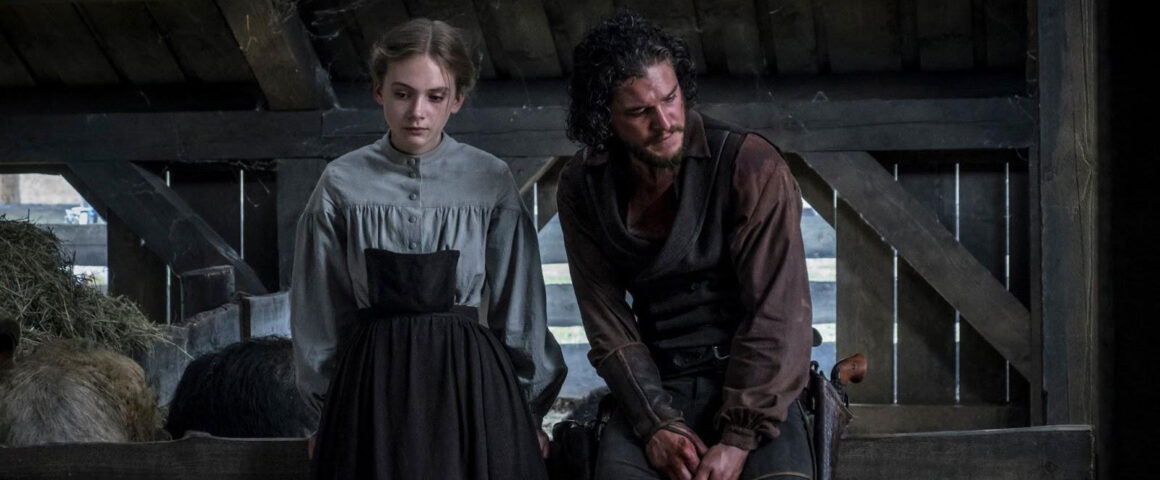The initial success of Brannon Braga and Adam Simon’s series “Salem” (2015-2017) and the staggering impact of Robert Eggers’ “The Witch” seems to have made American Puritans into high fashion for horror entertainment. Director Martin Koolhoven and producer Els Vandevorst had, for several years before the releases of the aforementioned titles, been producing their own hellish variation of Puritan life, even throwing their salaries into the budget to accomplish production. Unfortunately, the central ideas, technical execution, and collection of talent of their production, Brimstone, aims loftier than what could be achieved, and therefore jangle harshly with one another.
The film is separated into four parts: Revelation, Exodus, Genesis and Retribution; following the exploits and tribulations of Liz (Dakota Fanning, “The Runaways”), a mute midwife with a disturbing past. Liz and her husband Eli (William Houston, “Dracula Untold”) foster their children Matthew (Jack Hollington, “Fearless” TV series) and Sam (Ivy George, “Paranormal Activity: The Ghost Dimension”) as any Puritan family would, until their peace is upset by the arrival of a new minister (Guy Pearce, “Iron Man 3”), spouting venomous rhetoric and damnation to all sinners in the community. Upon the delivery of a neighbor’s stillborn poisoning her reputation in the town, grit and resolve are all that keep Liz in the battle against the vindictive zealot seeking to unequivocally destroy her life.
The scope of Brimstone would be far better suited to a television miniseries than a single two-and-a-half-hour feature; its central ideas of retributive justice, maturity, sexuality, and the loss of innocence are stunted due to its limited structure. Hastily constructed settings and character dynamics produce an off-kilter arc, lingering on only a few key moments before resorting to bare minimal segues/resolutions to move the plot along. Characters are also just thrown in to serve as meat for the slaughter, when their place in the story and influence on events could be so much more enthralling. Koolhoven’s screenplay is janky, but not necessarily poorly constructed.
Job ter Burg’s editing is proficient to let the resonance of the visuals linger (though he did a much superior job on Paul Verhoeven’s “Elle”). Composer Junkie XL (“Batman v Superman: Dawn of Justice”) throws his extensive prowess into the music, though he underscores far too much, overusing and smothering the potential of his pieces by the end. Rogier Stoffers’ cinematography here marks a new career best for him since “Quills,” though for all of its striking visuals and play with color and movement, it can sometimes ring hollow. Whether or not this is due to many nihilistic overtones is up for debate. Also (maybe by coincidence), there appears to be numerous allusions and literal shots lifted from David Milch’s “Deadwood,” particularly in the Exodus sequence.
The most commendable element of Brimstone is its cast, whose performances (though in several instances, quite mannerist and stilted) are the film’s backbone. Pearce is downright terrifying and owns every fiber of his character, Fanning (playing almost exclusively through her eyes) makes her every moment empathetic and human, despite the context. George gives a standout performance, demonstrating a surprising range for a child actor, and hopefully serving as a healthy augury for her budding career. Emilia Jones (“High-Rise”) provides a reserved, yet striking turn as Joanna and Kit Harington (“Seventh Son”) as Samuel is fun, yet both are grossly underexplored.
I wanted to enjoy Brimstone far more than I did, drawn to its creativity, and numerous horrific implications and twisted themes. But a stellar cast guided by an ambitious and crafty director cannot seal the breach left by the underdeveloped nature of the concept, directly contributes to an impressive yet frustrating viewing experience.




'Movie Review: Brimstone (2016)' has no comments